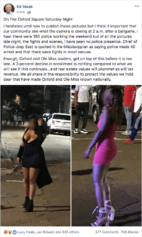Protestors against recent changes at the University of Mississippi say the school’s current plan to create a more diverse and inclusive environment will only “erase the history” that made the school what it is today.
Dozens of people took to the university’s campus on Saturday with Confederate flags in hand, declaring their opposition to a plan that they say will “sweep history under the rug.”
The university has been working to rid itself of a racist reputation and connections to a slavery-driven past by banning the use of Confederate flags at sports games and replacing their Colonel Reb mascot with a black bear.
The latest move has been a proposal to change a short street’s name from Confederate Drive to Chapel Lane and create a new position of vice chancellor of diversity and inclusion.
The current plan would also restrict the use of the term “Ole Miss” to sports and recreational activities instead of academics.
While Chancellor Dan Jones said the university’s intentions are to simply make the school a more diverse and welcoming environment, opponents of the changes believe the plan does not respect the school’s history.
“Not only are they not presenting the true history, but they’re trying to erase the history that is there,” Debbie Sidle, one of the organizers of Saturday’s protest and the mother of two students who graduated from Ole Miss, told The Clarion-Ledger.
Even people who did not attend the school were eager to defend the Confederate flag that has long haunted many minorities, especially in the Deep South.
“I’m a 40-year-old man,” said Kevin Nelm, a Corinth resident who has supported the university despite never attending himself. “If I don’t start standing up for my heritage, then we’re going to lose it with all this political correctness.”
Nelm said people who are offended by the Confederate flag need to “read the history books.”
For one African-American student, taking away flags and renaming streets does not even scratch the surface of the real issue.
Courtney Brown, who was sitting on the university’s lawn when the protestors marched around carrying Confederate flags, said the flag did not offend her.
Brown said flags are mere objects and street names are just titles.
“It’s not about a logo or the flag,” Brown told the Natchez Democrat. “It’s about people and what’s inside of them. People will always be offended by different things. Those flags and the Civil War and everything that’s happened is a part of Oxford’s history, and it shouldn’t be changed.”
In spite of the protest, Jones is standing firm behind his plan.
In a recent press release, he said that the new “comprehensive plan” will only bring the university closer to its goal of “being a warm and welcoming place for every person, every day, regardless of race, religious preference, country of origin, ability, ethnicity, gender, sexual orientation or gender expression.”
The university has been battling a racist reputation since a deadly riot was sparked by the school’s admission of its first Black student, James Meredith, back in 1962.
Earlier this year, the statue of Meredith on the school’s campus was vandalized and desecrated with a noose and a Georgia state flag with a Confederate logo.



